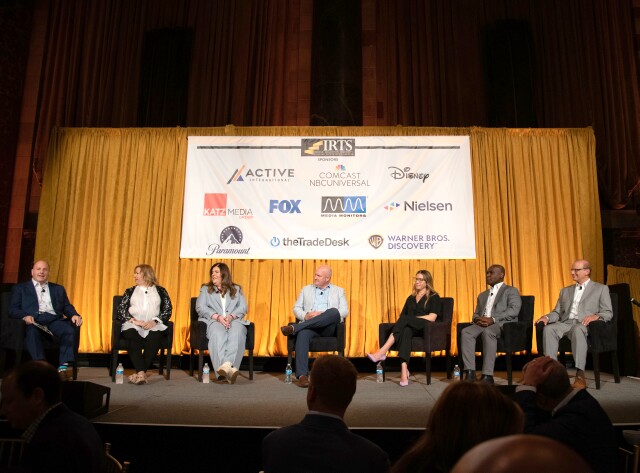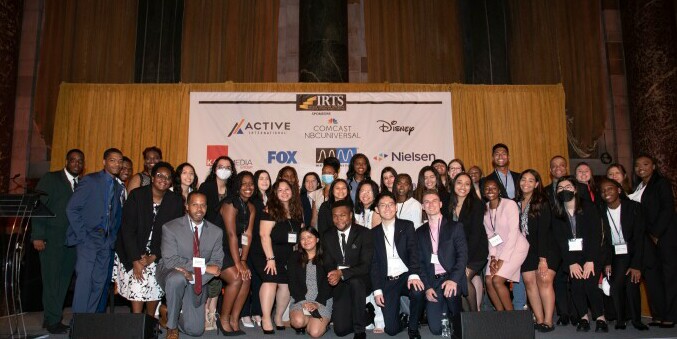IRTS Newsmaker Breakfast Showcases a New Era of Upfront TV Ad Sales

The 2022-23 Upfront marketplace now underway could be a tipping point to a new era of how TV advertising is contracted. That's the outlook offered this past Tuesday by panelists at the IRTS Foundation's Newsmaker Breakfast in New York -- the first in-person edition of this annual event to take place since the coronavirus pandemic began two years ago.
One pro-tipping point argument raised at the start of the session: Major TV content providers now bring expansive portfolios of channels and services for Upfront sales consideration. These portfolios encompass linear broadcast and cable networks, syndicated series and combinations of on-demand/linear services and multichannel bundles distributed through smart TV sets and gadgets. "We're taking more of the portfolio approach. We're not selling three networks or four dayparts anymore," acknowledged Jon Steinlauf, Warner Bros. Discovery's Chief U.S. Advertising Sales Officer. "We're selling 20 linear networks and [many] diginets. It gets more complicated all the time."
In fact, the panel went beyond participation from leading programmers and ad industry executives to include a smart TV product representative -- Roku Vice President of Ad Revenue and Marketing Solutions Alison Levin. For the first time ever, Roku and other smart TV companies are involved in this Upfront as content/channel creators, not just content/channel aggregators with ad avails.
Several participants also want this Upfront season to be the first where the parameters determining sales shift from buying time based on audience reach, what audience gets reached best and CPMs to product/service sales and the quality of audience driving those sales. The parameters, in Carat U.S. CEO Mike Law's view, extend to better, ongoing audience measurement supplied by a number of research organizations instead of one.
"We're in the third inning [of reaching this outcome], and I hope we don't replay the third inning," Law declared.
"We're starting a new year with a whole new set of rules," added Kirk McDonald, Group M's North America Chief Executive Officer. "All video is converging, and clients want value. New alliances will be formed. This space will be reset whether we like it or not."
Levin is optimistic that in this and future Upfronts, artificial intelligence, machine learning and other technology breakthroughs will be incorporated into the way viewership and purchase data is collected and analyzed. That leads to more reliable deal-making between advertisers and programmers, as well as adoption of interactive TV campaigns and commerce formats where viewers can order products and services through the TV set without using a smartphone or other device.
Roku anticipates launching shoppable messages from a number of sponsors this summer. "We could do much more on getting the right creative to the right viewers at the right moment," Levin maintained. "We want to make shoppable as easy as possible with one click."
Innovation on numerous fronts is high on Rita Ferro's playbook to generate a new Upfront sales era. "There's a number of innovations happening out there," Disney Media and Entertainment Distribution's Advertising Sales President noted. "It's great to be a leader or a follower on them, working with new technology or measurement approaches. An infrastructure is being put in place. This is the Upfront where we'll see some action."
No matter how many companies come forward with new approaches to tracking demographic behavior or product sales, "We must make sure everyone has enough opportunities and the ability to [work these opportunities] across platforms," added Magna U.S. President Dani Benowitz. "Then we go forward."
Programmatic and addressable ad sales will increase over time, the panelists agreed. Nevertheless, the quality of creative messages and campaigns remains an important driver in stimulating viewer response, Law argued. "I want more people spending more time creating great moments for our brands," he said.
Benowitz also called for an expanded effort on everyone's part to diversify their workforce and allocate more ad dollars on TV ventures owned by communities of color and other underrepresented media audiences. "We have a lot of work to do … and we need to show and respond to the buying power of diverse audiences," she continued.
Magna is in the second year of a multi-element "Equity Upfront" outreach -- one element being a three-day conference this past April. The event featured presentations from TV ventures owned by African Americans, Latinos, Asian-Americans and members of the LGBTQ+ community. Participants included Allen Media Group, LATV, Urban Edge Networks, Revry and Revolt.
Prior to the panel session, the IRTS Foundation introduced its 2022 class of college and university student fellows, sponsored by a variety of content and advertising industry companies. More than 40 students and recent graduates from around the country will do these fellowships this summer. Three students will spend their fellowship time here atMediaVillage, involved with various projects. We welcome Jada Atwood, Sierra Addams and Jaliah Robinson.

Click the social buttons to share this content with your friends and colleagues.
The opinions and points of view expressed in this content are exclusively the views of the author and/or subject(s) and do not necessarily represent the views of MediaVillage.com/MyersBizNet, Inc. management or associated writers.


